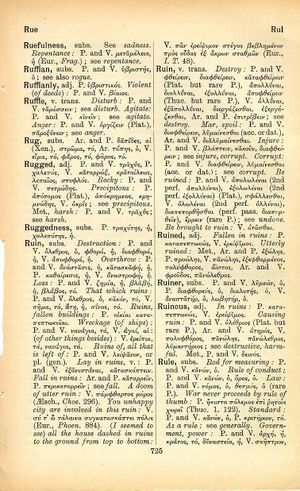ruinous: Difference between revisions
From LSJ
ἁρμονίη ἀφανὴς φανερῆς κρείττων → the hidden attunement is better than the obvious one, invisible connection is stronger than visible, harmony we can't see is stronger than harmony we can, unseen harmony is stronger than what we can see
(CSV4) |
m (Woodhouse1 replacement) |
||
| Line 1: | Line 1: | ||
{{Woodhouse1 | {{Woodhouse1 | ||
|Text=[[File:woodhouse_725.jpg|thumb|link={{filepath:woodhouse_725.jpg}}]] | |Text=[[File:woodhouse_725.jpg|thumb|link={{filepath:woodhouse_725.jpg}}]] | ||
===adjective=== | |||
Met., P. and V. [[δεινός]]. | [[in ruins]]: [[prose|P.]] [[καταπεπτωκώς]], [[verse|V.]] [[ἐρείψιμος]]. | ||
[[causing ruin]]: [[prose|P.]] and [[verse|V.]] [[ὀλέθριος]] ([[Plato]] but rare [[prose|P.]]), [[Aristophanes|Ar.]] and [[verse|V.]] [[ἀτηρός]], [[verse|V.]] [[πολυφθόρος]], [[πανώλης]], [[πανώλεθρος]], [[λυμαντήριος]]; see [[destructive]], [[harmful]]. | |||
Met., [[prose|P.]] and [[verse|V.]] [[δεινός]]. | |||
}} | }} | ||
Revision as of 08:54, 20 May 2020
English > Greek (Woodhouse)
adjective
in ruins: P. καταπεπτωκώς, V. ἐρείψιμος.
causing ruin: P. and V. ὀλέθριος (Plato but rare P.), Ar. and V. ἀτηρός, V. πολυφθόρος, πανώλης, πανώλεθρος, λυμαντήριος; see destructive, harmful.

